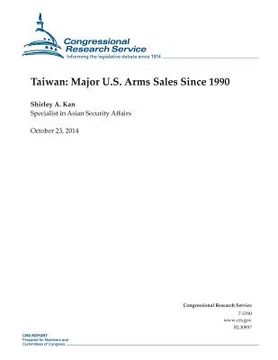Taiwan: Major U.S. Arms Sales Since 1990 (in English)
Synopsis "Taiwan: Major U.S. Arms Sales Since 1990 (in English)"
This report, updated through the 113th Congress, discusses U.S. security assistance to Taiwan (calling itself Republic of China (ROC)), including policy issues for Congress and legislation. Congress has oversight of the Taiwan Relations Act (TRA), P.L. 96-8, which has governed arms sales to Taiwan since 1979, when the United States recognized the People's Republic of China (PRC) instead of the ROC. The U.S.-ROC Mutual Defense Treaty terminated in 1979. Two other relevant parts of the "one China" policy are the August 17, 1982, U.S.-PRC Joint Communique and the "Six Assurances" to Taiwan. U.S. arms sales to Taiwan have been significant. The United States also expanded military ties with Taiwan after the PRC's missile firings in 1995-1996. At the last U.S.-Taiwan annual arms sales talks on April 24, 2001, President George W. Bush approved for possible sale diesel-electric submarines, P-3 anti-submarine warfare (ASW) aircraft (linked to the submarine sale), four decommissioned U.S. Kidd-class destroyers, and other items. Bush also deferred decisions on Aegis-equipped destroyers and other items, while denying other requests. Afterward, attention turned to Taiwan, where the military, civilian officials, and legislators from competing political parties debated contentious issues about how much to spend on defense and which U.S. weapons to acquire, despite the increasing threat (including a missile buildup) from the PRC's military, the People's Liberation Army (PLA). The Pentagon also has broadened its concern from Taiwan's arms purchases to its defense spending, seriousness in self-defense and protection of secrets, joint capabilities, deterrence, operational readiness, critical infrastructure protection, and innovative, asymmetrical advantages. Blocked by the Kuomintang (KMT) party in the Legislative Yuan (LY) that opposed the Democratic Progressive Party's (DPP's) president (2000-2008), the Special Budget (not passed) for submarines, P-3C ASW aircraft, and PAC-3 missile defense systems was cut from $18 billion in 2004 to $9 billion (for submarines only) in 2005. In March 2006, Taiwan's defense minister requested a Supplemental Defense Budget (not passed) in part for submarine procurement, P-3Cs, and PAC-2 upgrades (not new PAC-3 missiles). In June 2007, the LY passed Taiwan's 2007 defense budget with funds for P-3C planes, PAC-2 upgrades, and F-16C/D fighters. In December 2007, the LY approved $62 million to start the submarine design phase. After the KMT's Ma Ying-jeou became President in May 2008, he resumed cross-strait talks, reduced tension, and retained the arms requests. However, Ma has failed to invest in defense at the bipartisan goal of budgeting at 3% of GDP. On June 5, 2014, the Pentagon reported to Congress that the PLA remains focused on Taiwan.

